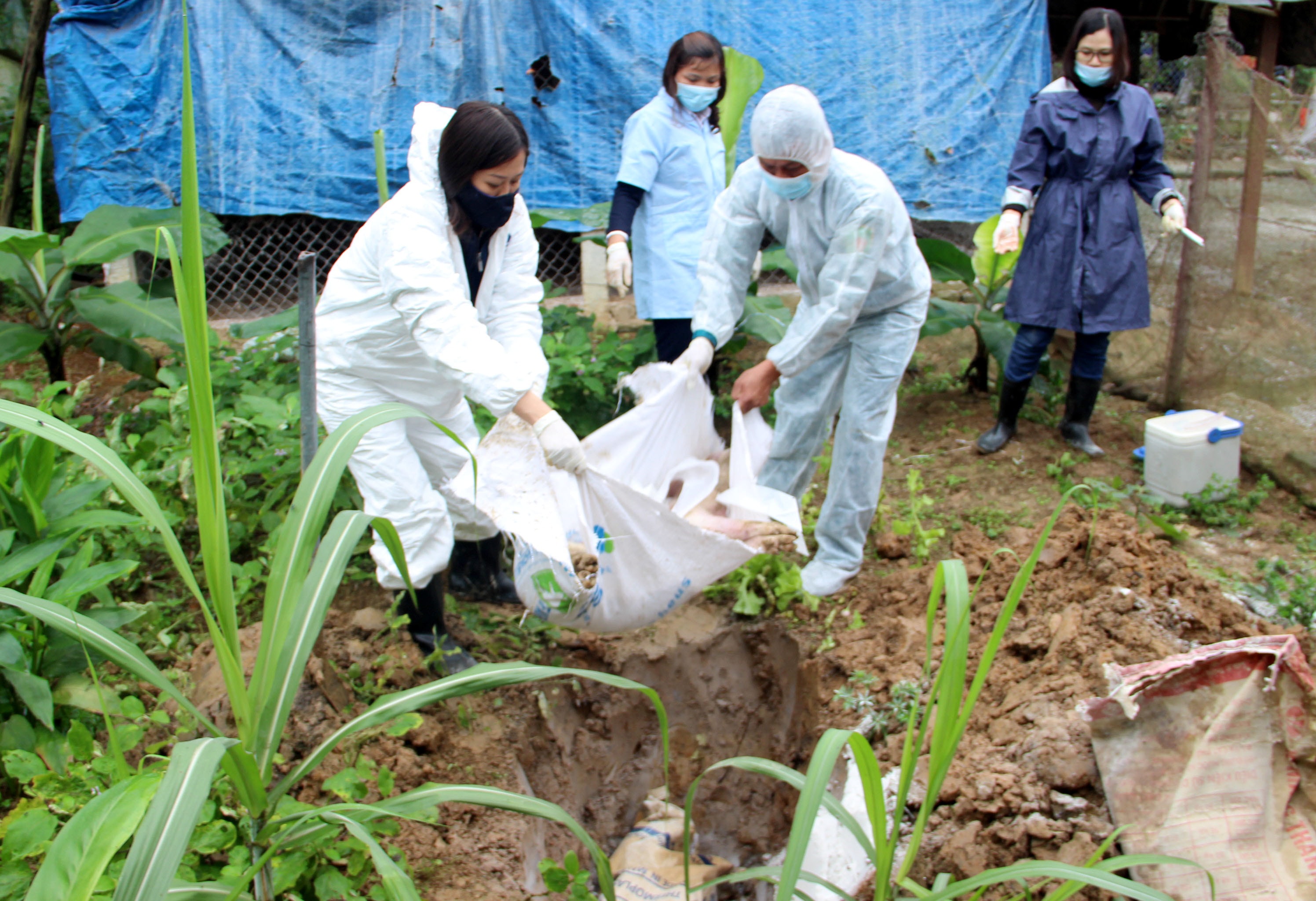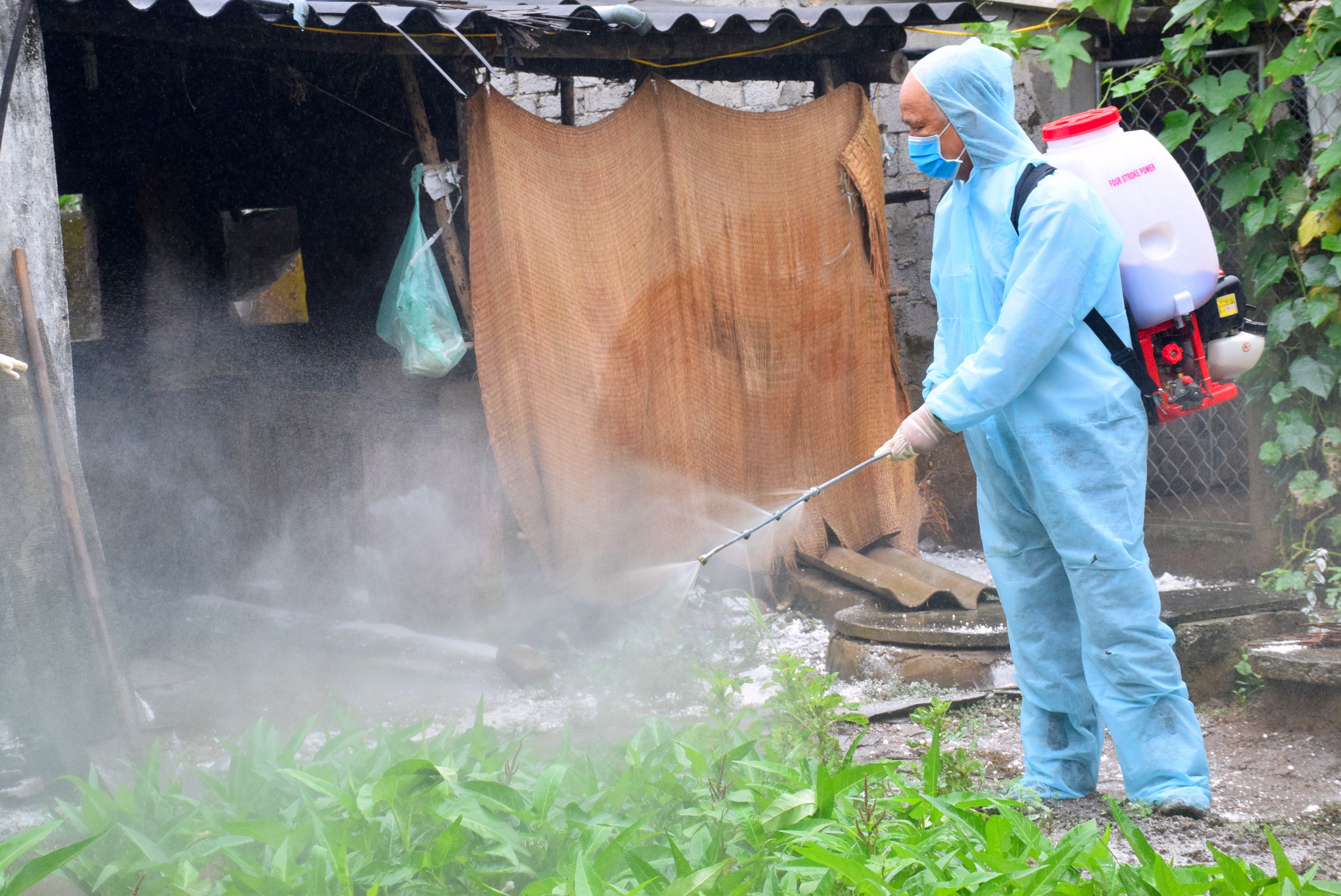Nghe An basically controls African swine fever
(Baonghean.vn) - With the participation of the entire political system, Nghe An has so far basically controlled the African swine fever epidemic. However, experts warn that the risk of an outbreak is high, and localities should strengthen close monitoring of the epidemic situation at the grassroots level.
 |
| Destroying pigs infected with African swine fever in Dien Chau district. Photo: Quang An |
African swine feverre-emerged in Nghe An province since early February 2021, with strong outbreaks in some localities such as Thanh Chuong, Dien Chau, Hung Nguyen, Yen Thanh, Do Luong, Que Phong... causing heavy economic damage to thousands of pig farming households, wasting the state budget and affecting pig consumption in the province in general.
Since the beginning of 2021, Nghe An has had 254 outbreaks of African swine fever (5,745 households/982 hamlets/254 communes) in 20 districts, cities and towns; number of pigs culled: 17,138; total weight 1,070,898 kg.
 |
| Veterinary agency takes samples to test for African swine fever. Photo: Xuan Hoang |
To quickly control the epidemic and minimize damage tobreederThe Department of Agriculture and Rural Development has proactively advised the Provincial People's Committee to issue many documents directing and guiding disease prevention and control in a manner appropriate and effective to the characteristics of the province and each different stage of disease prevention.
Including some important documents such as Decision No. 812/QD-UBND dated March 19, 2019 on Promulgating the Emergency Response Scenario for ASF in the province.Nghe Anprovide specific instructions on measures to be implemented from provincial, district, and commune levels to livestock farmers.
Along with the advisory work, direction and implementation of drastic and synchronous epidemic prevention and control by all levels, sectors and localities and the efforts of the people, the Ministry of Agriculture and Rural Development has done a good job of epidemic prevention and control, creating conditions for herd restoration and increase. Therefore, up to now, ASF has been basically controlled, the total herd of pigs reached 914,620, an increase of 3.67% over the same period in 2020.
 |
| An African swine fever control checkpoint in Hung Nguyen district. Photo: Quang An |
According to the data of the Department of Animal Husbandry and Veterinary Medicine, currently in the province there are only 07 ASF outbreaks occurring sporadically in some small-scale livestock households, farmers have not passed 21 days, these outbreaks have passed 15 days without new cases in 05 districts: Hung Nguyen, Anh Son, Que Phong, Quy Hop, Tuong Duong. The number of outbreaks that have passed 21 days and have been declared over is 247 outbreaks (accounting for more than 97.64% of the total number of outbreaks).
Mr. Ngo Duc Quynh - Deputy Head of the Department of Animal Husbandry and Veterinary Medicine said: To effectively prevent and control ASF, localities need to strictly implement solutions according to the instructions in Decision No. 812/QD-UBND and Official Dispatch No. 3369/SNN-CNTY dated November 5, 2019 of the Department of Agriculture and Rural Development on strengthening a number of comprehensive technical measures to ensure biosafety in pig farming to prevent and control African swine fever. For districts with an epidemic, it is necessary to mobilize all resources (people, vaccines, chemicals...) to urgently control and suppress the epidemic, not allowing it to spread.
 |
| Veterinary agencies spray disinfectants at the outbreak in Yen Thanh district. Photo: Xuan Hoang |
Although the epidemic has been basically controlled, the risk of an outbreak is still very high, so localities need to closely monitor the epidemic situation at the facility; promptly detect and destroy diseased pigs according to regulations; strengthen inspection of herd restoration and herd expansion at livestock facilities to ensure compliance with instructions from specialized agencies; promptly detect households that import herds without declaration.
Along with that, strictly inspect and handle cases of hiding epidemics, slaughtering and selling sick pigs; do a good job of propaganda; guide farmers to apply good measures.biosecurity farming, do not let African Swine Fever occur.
 |
| Farmers need to regularly implement disease prevention solutions in their livestock barn systems. Photo: Xuan Hoang |
For livestock farmers, it is necessary to apply bio-safe livestock farming, focusing on remote disease prevention:buypig breedingmust have clear origin, be fully vaccinated according to regulations, and be quarantined; barns must have a waste treatment system;In front of the barn door, there must be a disinfection pit containing lime powder or chemicals; the barn is separate from the living area; tools, clothes, boots, shoes, and sandals used for livestock farming must be separate and disinfected regularly; periodicallyDisinfect, sterilize, treat the livestock environment, compost; limit or prohibit outsiders from entering the livestock area; take measures to destroy and prevent insects, rats or other animals (dogs, cats...) from entering the livestock area...
Performgood 06not in livestock farming, trading, slaughtering:No hidden translation;Do not buy, sell or transport sick or dead pigs;Do not slaughter or consume meat from sick or dead pigs;Do not throw pigs into the environment;Do not use unheated leftovers;Do not use pond, lake, canal or ditch water to bathe or give pigs water to drink.”.
